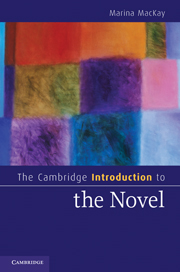Book contents
- Frontmatter
- Contents
- Acknowledgments
- About this book
- Chapter 1 Why the novel matters
- Miguel de Cervantes, Don Quixote (1605, 1615)
- Chapter 2 Origins of the novel
- Laurence Sterne, The Life and Opinions of Tristram Shandy, Gentleman (1759–67)
- Chapter 3 Narrating the novel
- James Hogg, The Private Memoirs and Confessions of a Justified Sinner (1824)
- Chapter 4 Character and the novel
- Nathaniel Hawthorne, The Scarlet Letter (1850)
- Chapter 5 Plotting the novel
- Gustave Flaubert, Madame Bovary (1857)
- Chapter 6 Setting the novel
- Charles Dickens, Bleak House (1853)
- Chapter 7 Time and history
- Virginia Woolf, To the Lighthouse (1927)
- Chapter 8 Genre and subgenre
- Graham Greene, The Ministry of Fear (1943)
- Chapter 9 Novel and anti-novel
- Thomas Pynchon, The Crying of Lot 49 (1966)
- Chapter 10 Novel, nation, community
- Salman Rushdie, Midnight's Children (1981)
- Chapter 11 Concluding
- Notes
- Glossary
- Further reading
- Index
- Cambridge Cultural Social Studies
Chapter 2 - Origins of the novel
Published online by Cambridge University Press: 05 June 2012
- Frontmatter
- Contents
- Acknowledgments
- About this book
- Chapter 1 Why the novel matters
- Miguel de Cervantes, Don Quixote (1605, 1615)
- Chapter 2 Origins of the novel
- Laurence Sterne, The Life and Opinions of Tristram Shandy, Gentleman (1759–67)
- Chapter 3 Narrating the novel
- James Hogg, The Private Memoirs and Confessions of a Justified Sinner (1824)
- Chapter 4 Character and the novel
- Nathaniel Hawthorne, The Scarlet Letter (1850)
- Chapter 5 Plotting the novel
- Gustave Flaubert, Madame Bovary (1857)
- Chapter 6 Setting the novel
- Charles Dickens, Bleak House (1853)
- Chapter 7 Time and history
- Virginia Woolf, To the Lighthouse (1927)
- Chapter 8 Genre and subgenre
- Graham Greene, The Ministry of Fear (1943)
- Chapter 9 Novel and anti-novel
- Thomas Pynchon, The Crying of Lot 49 (1966)
- Chapter 10 Novel, nation, community
- Salman Rushdie, Midnight's Children (1981)
- Chapter 11 Concluding
- Notes
- Glossary
- Further reading
- Index
- Cambridge Cultural Social Studies
Summary
The story of the novel's emergence can be told differently depending on what you think a novel actually is. And depending on how you define the novel, you could attribute its emergence to the Mediterranean and Middle Eastern empire of the ancient Greeks or to England over a millennium and a half later. So the divergence is enormous, both geographically and temporally: on the one hand, the novel is the product of a culturally hybrid classical antiquity, and, on the other, the outcome of Britain's transition into a capitalist modernity. This chapter surveys some very different accounts of the origins of the novel, and it turns in closing to a follow-up question: why do we want to be able to pinpoint when, where, and how the novel emerged?
Dates and definitions
“This book is the revelation of a very well-kept secret,” Margaret Anne Doody writes in the opening line of The True Story of the Novel (1996): “that the Novel as a form of literature in the West has a continuous history of about two thousand years.” Doody goes on to offer a history of prose narrative which suggests that the novel is as old as Western civilization itself, beginning with ancient Greek fictions written around the time of Christ, among them those works that Bakhtin had considered when he sought to distinguish the irreverent novel from the stately classical epic. But are these all really novels?
- Type
- Chapter
- Information
- The Cambridge Introduction to the Novel , pp. 21 - 33Publisher: Cambridge University PressPrint publication year: 2010

